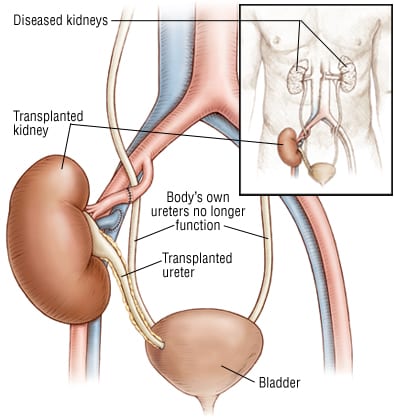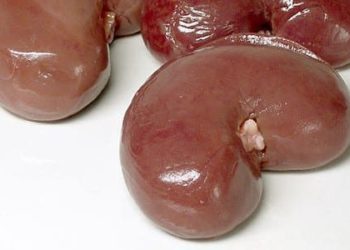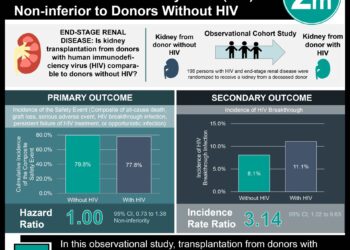Patient Basics: Kidney Transplant
Originally published by Harvard Health.
What Is It?
A kidney transplant is surgery in which a person who has permanent kidney failure receives a healthy kidney from another person. This single, healthy kidney takes on the workload of both of the person’s failed kidneys. The failed kidneys usually are left in place. The new kidney is added to the abdomen.
The new kidney can come from a living or dead donor. A living donor is often a close blood relative of the person who receives the new kidney (the recipient). However, in certain cases, a recipient’s spouse or friend can be a kidney donor.
A kidney donor must be a good match for the recipient. This means that the donor and recipient have similar chemical characteristics, called antigens, on their body cells. When these antigens match, there is less risk that the recipient’s immune system will see the donor’s kidney as a foreign object and reject it.
What It’s Used For
Kidney transplants are used to treat advanced, permanent kidney failure. Kidney failure is also called chronic renal failure or end-stage renal disease.
In people with permanent kidney failure, both kidneys lose their ability to filter the blood and make urine. When this happens, toxic waste products and excess minerals accumulate in the bloodstream. The body can retain excess water, and blood pressure can rise. Kidney failure can also lead to weakened bones and a decrease in red blood cells.
A variety of medical conditions can cause permanent kidney failure. These include:
- Diabetes
- High blood pressure
- Inflammation of the kidney’s filtering units
- Certain medications
- Polycystic kidney disease, kidney tumors and severe kidney infections
- Failure of a kidney transplant
Once a person develops permanent kidney failure, he or she usually is treated with dialysis. Dialysis is a mechanical filtering process. It removes waste products and excess water from the blood. Dialysis can be done on fluid from the abdomen or directly on the blood.
Dialysis treatments keep the person alive, with a healthy balance of fluid and minerals. These treatments either must be continued for life or until a kidney transplant can be done.
A kidney transplant allows the person to live without dialysis, with a more normal diet and lifestyle. In the long run, a kidney transplant is also less expensive than dialysis. It usually helps the person to live longer.
Preparation
You have to meet certain criteria to be approved for a kidney transplant. You cannot have an active infection, cancer or severe circulatory problems involving your heart, brain or major blood vessels. You must be willing to take medications for the rest of your life to prevent your body from rejecting the new kidney.
You will need a thorough medical evaluation. This includes:
- A physical examination
- A chest X-ray
- An electrocardiogram (EKG)
- Blood tests to check for:
- Anemia
- Viral illnesses such as HIV, hepatitis, herpes simplex virus and cytomegalovirus
- Your blood type and tissue type to determine if a donor is a good match.
- Cardiac tests
- Screenings for certain types of cancer
- Blood samples to check:
- Possible additional tests:
If you smoke or have problems with substance abuse, you must complete a treatment program before you receive your new kidney.
While you prepare for your kidney transplant, you will meet regularly with a transplant team at the medical center where you will have your surgery. These professionals can offer you a wide range of support services during the pre-transplant period.
The transplant team usually includes:
- A doctor who specializes in kidney problems (a nephrologist)
- A transplant surgeon
- Nurses
- A social worker
If your kidney transplant will come from a living donor, you usually will be able to schedule the time of your transplant surgery. In most cases, your pre-transplant waiting period will be only a few weeks. During this time, your donor will have medical tests. These will ensure that he or she is strong enough to undergo surgery. Additional tests will confirm that the donor’s kidneys are functioning normally.
If you do not have a living kidney donor, your name will be placed on a waitlist for a kidney from a dead donor. This donor must be a good match for you. The average waiting time for a kidney from a dead donor is two to three years. While you are on the waiting list, the transplant team will evaluate your health periodically. You must have medical insurance that will cover the cost of a transplant or be able to pay for it yourself.
How It’s Done
Dead Kidney Donor
Once a good donor match is found the transplant team will notify you immediately. You will travel to the transplant center, where you will have some brief medical tests. These tests will confirm that you are still free of infection and ready for surgery. If necessary, you also will have a pre-surgery dialysis treatment.
Once you are ready for surgery, an intravenous (IV) line will be inserted into your arm to deliver fluids and medications into a vein. You will be given general anesthesia. An incision will be made in your lower abdomen. The donor kidney will be positioned inside you. Its blood vessels will be connected to yours. Finally, the donor kidney’s ureter will be connected to your bladder. The ureter is the tube that carries urine away from the kidney.
Your new kidney probably will begin to filter blood and make urine almost immediately after it is transplanted. A plastic tube (catheter) will be inserted temporarily into your bladder to collect the urine that is being made. Your incision will be closed, and you will be taken to the intensive care unit. The entire procedure usually takes three to four hours.
For the first day or two after surgery, you will receive fluids through the IV in your arm. After that, your urine flow should stabilize. You will be able to start drinking clear fluids, and then gradually resume a regular diet. After a few days, the bladder catheter will be removed. You will be allowed to go home. The total time in the hospital is usually four to six days.
If you are not producing enough urine after surgery, you may need a few dialysis treatments. This is rare, and the treatments will stop once your new kidney begins working well enough on its own.
Living Kidney Donor
If you are receiving a new kidney from a living donor, you and your donor probably will be in side-by-side operating rooms. In many medical centers, the donor’s kidney is removed with laparoscopic surgery. This uses a tiny camera to guide surgical instruments inside the body. The camera and surgical instruments are inserted into the body through several small incisions, rather than through a single, large incision. As a result, the donor’s average hospital stay is shorter than with traditional surgery. Recovery is also quicker.
Traditional surgery requires a larger incision in the side between the ribs and the hip. It also involves the removal of a donor’s rib.
Once the donor kidney has been removed, the rest of the transplant procedure is the same as for a dead kidney donor.
Follow-Up
Before you are discharged from the hospital, your doctor will give you prescriptions for several anti-rejection (immunosuppressive) drugs. These medicines decrease your body’s immune response. They reduce the risk that you will reject your new kidney. You will be given a dietary plan and a schedule for follow-up visits to your transplant team.
As part of your follow-up care, the transplant team will ask you to measure and record your weight, blood pressure, pulse, and body temperature every day. They will tell you how to determine if one of these measurements is abnormal.
If you have any questions, concerns or unexpected symptoms after your transplant, call the transplant team.
Risks
A kidney transplant carries the usual risks of any major surgery. These include the risk of:
- Bleeding
- Infection
- Heart attack
- Stroke
- Side effects from anesthesia
There are additional risks that are more specific to kidney transplant. These include:
- A danger that blood vessels in the transplanted kidney may become clotted or narrowed after surgery.
- Urine leaking inside the body
- Urine flow becoming obstructed
- Large blood clots forming inside the bladder
There is also a risk that the new kidney will fail or be rejected. Transplants from living donors are generally more successful than transplants from dead donors.
Immunosuppressive drugs can cause significant side effects. These can include:
- Weight gain
- Increased facial hair
- Acne
- Cataracts
- Diabetes
- High blood pressure
- Bone disease
- Other problems
In the long-term, immunosuppressive drugs can increase the risk of infections and certain types of cancer.
In spite of these potential problems, most kidney transplants are successful. Most people find that their quality of life is much better after a kidney transplant.
When To Call A Professional
After your discharge, contact your transplant team immediately if:
- You develop a fever
- You have pain or soreness in the area of your new kidney
- Your incision becomes red, swollen and painful, or oozes blood
- Your urine output increases or decreases significantly
- Your weight, blood pressure, pulse or body temperature is outside the range given to you by the transplant team
Additional Info
United Network for Organ Sharing (UNOS)
1100 Boulders Parkway, Suite 500
P.O. Box 13770
Richmond, VA 23225-8770
Toll-Free: (888) 894-6301
http://www.unos.org/
U.S. Department of Health and Human Services
200 Independence Ave., SW
Washington, DC 20201
Phone: (202) 619-0257
Toll-Free: (877) 696-6775
http://www.dhhs.gov/
National Kidney Foundation
30 East 33rd St.
New York, NY 10016
Phone: (212) 889-2210
Toll-Free: (800) 622-9010
Fax: (212) 689-9261
http://www.kidney.org/










